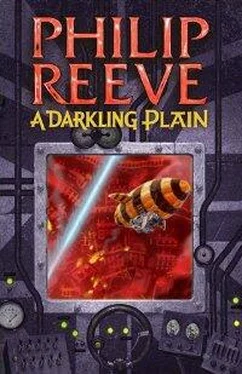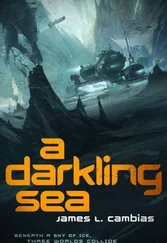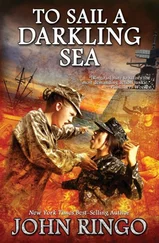Anyway, Dad’s been very keen to do his bit. At first he seemed intent on trying to help the Engineers, but the Childermass machines are so different from any technology he’s seen before that I think he just got in the way. So he started helping the men lug bits of salvage up to the hangar, but I had a quiet word with Dr. Childermass and explained about his heart trouble, and she had a q. word with Chudleigh Pomeroy, who took Dad aside and said what New London really needs is a museum, so that even if it roams to the far side of the world, the people who live aboard it will never forget the old London and what became of it. And since none of us have the time, Tom,” he said, “perhaps you wouldn’t mind putting together a collection?” So Dad has been appointed Head Historian and spends his days scouring the rust heaps for artifacts that will say something to future generations about his London—everything from old drain covers and tier-support ties to a little statue of the goddess Clio from somebody’s household shrine.
Meanwhile, I’ve been out patrolling with the other young Londoners. Mr. Garamond was v. opposed to it at first, but Mr. Pomeroy told him not to be such a bloody fool, and Angie and her friends are all very friendly, and most impressed when I told them I’d been in an actual battle and seen Stalkers and Tumblers and stuff. (I didn’t tell them how completely terrified I was, as it might be bad for morale.) Anyway, I’ve been right across the main debris field several times. It’s very spooky, esp. at night, but Angie and Cat and the rest are good company, and I’ve been given a crossbow to use if we’re attacked—I’m not sure I could actually shoot anyone, but it makes me feel a bit braver.
What I’d really like is one of the lightning guns the Engineers built to deal with Stalkers, but there aren’t very many of those, and only Mr. G’s most trusted fighters get to use them—Saab and Cat and people. The Green Storm’s Stalker-birds have been getting very nosy these past few weeks, and the danger bell at Crouch End is forever ringing, telling everyone to get under cover because some flea-bitten old dead buzzard is circling overhead, having a good look at us. Mostly we’ve just taken to ignoring them, but when one gets too close to the Womb, the boys on duty in the crow’s nests there shoot it down with their lightning guns; there are half a dozen hanging outside Crouch End now, all singed and charcoaly.
There is one other way of getting rid of them; it’s much more dangerous, and Angie and her friends treat it as a sort of sport. Last week, when we were out patrolling, a Stalker-bird came flying over us. We’re supposed to hide when that happens, but Angie said, “Let’s have a spot of mollyhawking! ” and jumped right out into the open, so I followed her. We went along one of the paths that wind between the wreckage heaps, and the bird came after us. I was worried it was going to attack, but Angie said they never do; they’re just spies, and she meant to serve it right for snooping.
We went on, walking quite fast, and soon I began to realize that we were heading toward the middle of the debris field, the bit they call Electric Lane. Till then I’d tended to agree with Wolf about the sprites—that they were just a fairy tale. But up there in the middle of London, where everything looks kind of scorched and melted, I suddenly wasn’t so sure. I asked Angie if it was safe, and she said “safe-ish,” which wasn’t very reassuring, but I didn’t want her to think I was a coward, so I kept going.
After a bit we came over a rise, and there in front of us was a sort of valley stretching right across the middle of the debris field. It looked quite peaceful, with ponds and trees on its floor, but the wreckage on either side was all charred and twisty-looking. Angie says that it’s the place where the core of MEDUSA fell, having melted its way right down through the seven tiers of London, and that’s why MEDUSA’s residue is strongest there. I don’t know if it’s true. Anyway, I only got a quick glimpse before Angie shoved me into a hollow of the wreckage all overhung with ivy. “Hide!” she said. The stupid old Stalker-bird didn’t see us, and went soaring out over the valley. It hadn’t gone fifty feet before a great snaggly fork of electricity came crackling out of the wreckage and roasted it; there was nothing left but a puff of smoke and some singed feathers that blew away on the wind!
I got a bit shuddery afterward, thinking what would have happened to the Jenny if we’d flown into Electric Lane that first day.
* * *
PS. Saab Peabody asked me out. I said I’d have to think about it and he said he supposed I had a boyfriend on the bird roads somewhere and I said I supposed I did. Silly, or what?
And now, because it’s late, and tomorrow is a big day—the first test of the new city—I am going to go to bed.
The morning of the test dawned dull and cloudy, threatening rain. The wind came from the west in indignant squalls, scattering a confetti storm of petals from the blossom trees that had taken root amid the debris of London.
Not wanting to impose himself on Wren, who was going up to the Womb with her new friends, Tom made the trek from Crouch End alone. He scanned the mounds of wreckage beside the track as he walked, for he had fallen into a habit of looking everywhere for fragments that might fit into the New London museum, and give the children who would one day be born upon the new city some notion of what old London had been like. When you knew where to look, the rusting ruin heaps were full of relics; street signs and door handles, hinges and tea urns. He spotted a pewter spoon with the crest of the Historians’ Guild on its handle and slipped it into his pocket. He had eaten with spoons like that every day of his childhood; it was like a shard of memory made solid, and he liked to think of those future Londoners looking at it and imagining his life.
Of course, they would never know the details: how he’d felt and what his dreams had been; his adventures on the bird roads, in the Ice Wastes and America. You couldn’t expect a pewter spoon to convey that sort of detail.
Lately, watching Wren writing in her journal of an evening, Tom had wondered if he shouldn’t try to write down some of the things that had happened to him, before it was too late. But he was no Thaddeus Valentine. He wasn’t even a Nimrod Pennyroyal. Writing did not come easily to him. Anyway, it would have meant writing about Hester, and he didn’t think he could do that. He’d not even spoken his wife’s name since he came to London. If his new friends ever wondered who Wren’s mother was, they kept it to themselves; perhaps they assumed that she was dead, and that Tom would find it painful to speak of her—which was not so far from the truth. How could he write about Hester for future generations when he did not understand himself why she had done the things she had, or what had made him love her?
Drawing close to the Womb, he caught up with a crowd of his fellow Londoners, all heading in the same direction. Clytie Potts was among them, and she greeted him warmly, glad of his company; her husband was aboard New London with the Engineers. “Dr. Childermass is afraid her Magnetic Levitation system might work too well,” she explained. “She wants an aviator on hand to steer New London down again if it goes too high.”
“Really?”
“It’s a joke, Tom.”
“Oh.” Tom laughed with her, although he didn’t find it funny. “I’m sorry. So much has changed since we were young … so many new inventions … I don’t really know what New London is capable of.” He thought of the Mag-Lev prototypes that Dr. Childermass had shown him: platforms the size of dinner tables that maneuvered around the Womb as if by magic, hanging several feet above the ground. If the new city survived, the Engineers were planning to apply the same technology to actual tables next; floating chairs and beds as well, and hovering Mag-Lev toys, which they would trade as curios to other small cities. Tom had even heard talk of Mag-Lev vehicles, which made him feel oddly sad, because if they worked, they would surely bring an end to the age of airships, and his dear old Jenny Haniver would be obsolete.
Читать дальше












